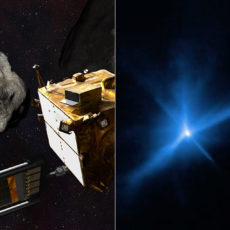
NASA / ESA’s Hubble Space Telescope recently observed dwarf galaxy IC 3476 undergoing a process called ram pressure stripping, which is driving unusually high levels of star formation within certain regions. It’s located 54 million light-years from Earth in the constellation Coma Berenices.

When people think of RAM, Random Access Memory in computing typically comes to mind, but in terms of physics, it refers to the pressure exerted on a body when it moves through some form of fluid, due to the overall resistance of the fluid. Yes, entire galaxies can also experience ram pressure, as the galaxies are the ‘bodies’ and the intergalactic or intracluster medium acts as the ‘fluid’.
- LEGO NASA Space Set - This adult LEGO set features the Space Shuttle Discovery and the Hubble Space Telescope from NASA’s 1990 STS-31 mission,...
- Solar System Exploration - Unlock the mysteries of our solar system with this engaging 2,354-piece project, packed with authentic details and...
- Shuttle Features Galore - The space shuttle model has an opening payload bay, retractable landing gear, opening cockpit, moving elevons, space arm,...
Ram pressure stripping occurs when the ram pressure results in gas being stripped from the galaxy. This stripping away of gas can lead to a reduction in the level of star formation, or even its complete cessation, as gas is absolutely key to the formation of stars. However, the ram pressure can also cause other parts of the galaxy to be compressed, which can actually boost star formation. This is what seems to be taking place in IC 3476,” said the European Space Agency.










